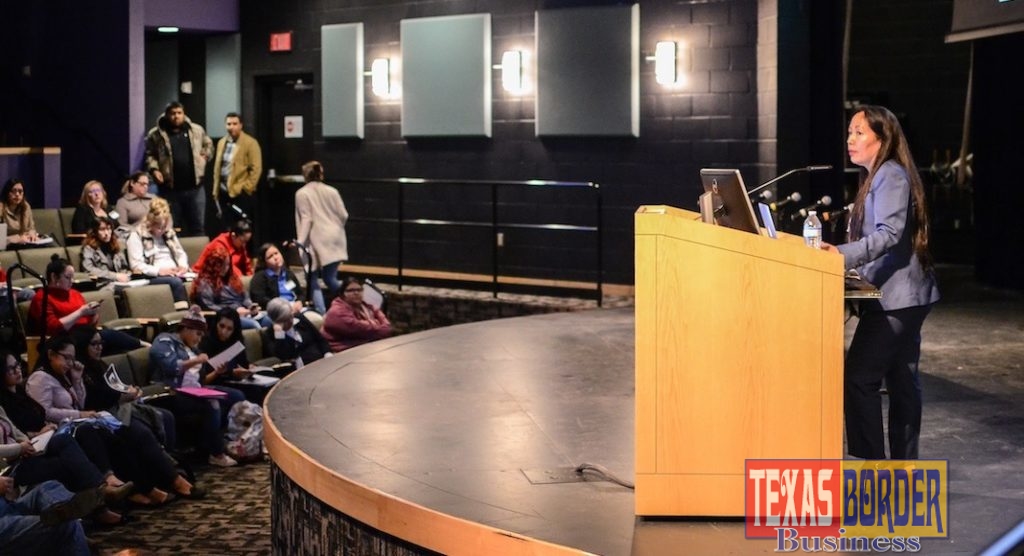
Texas Border Business
MCALLEN, TEXAS – Comparing the current trade in human beings as a form of modern-day slavery, students, faculty, and global experts combatting the issue of human trafficking arrived at South Texas College this week to highlight what they called a true crime against humanity.
This year’s 14th annual Human Trafficking Symposium entitled “The Nexus of Exploitation: The Global Economy, Human Trafficking, and the Marginalized” took place on April 1-2. The annual event, which is dedicated to raising community awareness about the pervasiveness of the labor and sex trafficking trades has emerged as an important forum for networking and training opportunities for professionals and practitioners within related fields.
“We are just trying to promote the fact that human trafficking is real and it does exist whether people acknowledge it or not,” said Ricky Hernandez, a dual enrollment student and part of Jennifer Clark’s Texas Government course at STC. Clark is chair of the Women’s Studies Committee, which organizes the annual symposium.
“This situation should be promoted more, and it should be more well known in society in order to prevent it from happening,” Hernandez said. “This event is making us all aware of what is happening right now. I now know that I am not the only one who cares about this issue, and they are represented by all the speakers who are here.”
STC President Dr. Shirley A. Reed opened the event, which then led to remarks by Sister Norma Pimentel, executive director of Catholic Charities of the Rio Grande Valley.
Keynote speakers Dr. Seàn Columb, lecturer in law from the University of Liverpool, spoke on the organ trade and Sarah Stillman, Director of Global Migration Project at Columbia University School of Journalism and staff writer with the New Yorker spoke on “Immigration Enforcement and Human Trafficking under the Trump Administration.”
U.S. Congressman Vicente Gonzalez (TX-15) offered opening remarks at the symposium remotely from Washington, D.C.
“The trade in human beings, a modern form of slavery, violates the God-given dignity of so many of our brothers and sisters, and constitutes a true crime against humanity,” Rep. Gonzalez said, quoting Pope Francis. “I thank South Texas College and every other organization and participant present for allowing me to open today’s discussion on this heartbreaking issue.”
The symposium this year was co-organized by at least 10 different organizations including the Women’s Studies Committee of South Texas College; the University of Texas- Rio Grande Valley Department of Criminal Justice; and Texas Department of State Health Services–Office of Border Public Health, and many others.
A lecturer in Law at the School of Law and Social Justice at the University of Liverpool, Columb’s research spans human trafficking, migration and transnational crime. His current research examines how the organ trade fits into the anti-trafficking framework, its link to organized crime and the wider political economy.
For the last five years, Columb has been doing research and fieldwork on the organ trade in North Africa, specifically Egypt.
“Part of the reason I began doing this research was I wanted to speak to the issues behind the organ trade, and I wanted to understand the social, economic and political factors that compel individuals to sell their kidneys to begin with. The organ trade has been recognized as a problem for a long time now,” Columb said.
Hidalgo County Criminal District Attorney Ricardo Rodriguez Jr. opened the final day of speakers on April 2. Keynote speakers included Alan Schonborn, Associate Director Strategic Development for Texas Governor Greg Abbott’s Child Sex Trafficking Team, and Lise Olsen, Houston Chronicle deputy investigations editor, and senior investigative reporter.
“Many of you in the audience may be a victim or you may know a victim. This is, without question, the most despicable way a human being can treat a fellow human being,” STC President Dr. Shirley A. Reed told attendees at the start of the symposium. “As president of South Texas College, I, unfortunately, see the consequences of human trafficking. I see broken lives. I see the heartbreak, physical pain, as well as the economic suffering, and we feel so helpless to do anything about it.
“It’s going to take many more conferences, much more political activity and support from Washington to help change this,” Dr. Reed said. “I am so proud that you are committed to making a difference…it tells me a whole lot about your commitment.”














